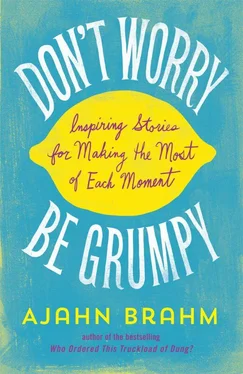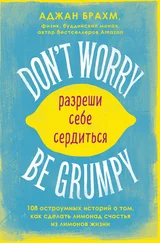One morning, one such postulant came to see me. He was English and in his mid twenties. He told me that he felt very, very guilty about something he had done the day before. He had not been able to sleep the previous night. He had come to me for a confession.
From beneath a drooping head, too ashamed to keep eye contact, he admitted that, late the previous afternoon, he was so hungry that he’d snuck into the monastery kitchen, made himself a sandwich, and eaten it. He had broken one of his training precepts.
“Very good,” I told him.
He glanced up.
“It is very good that you’re being honest and telling me what you’ve done. Now try to eat more at our 11:00 lunchtime, and if you are still hungry, you can drink some fruit juice or have a honey drink, which are allowable. You may even eat some dark chocolate, that’s okay too. Now you may go.”
“What? Aren’t you going to punish me?”
“No, we don’t do punishments in Buddhist monasteries.”
“That’s not good enough,” he continued. “I know my character. If you don’t give me penance, I’ll just do the same thing again.”
I was on the spot. How does one deal with such a person who believes that only punishment can train one to be disciplined? Then an idea came to me.
The previous day, I had been reading Robert Hughes’ historical novel about early Australia called The Fatal Shore . The book describes the extremely brutal punishments inflicted on convicts using a vicious whip called the “cat o’ nine tails,” or “the cat” for short.
“Okay,” I told our miscreant postulant, “I’ll give you a punishment, a traditional Australian punisment. I will give you… fifty strokes of the cat!”
The poor boy’s face drained of color. His lips started to quiver (so much for the English stiff upper lip). He was thinking “Oh no! The abbot is going to flog me. That’s not what I meant by a penance.”
Because he was new to Buddhism, he actually believed he was going to be whipped for stealing a sandwich. Then I explained to him what “fifty strokes of the cat” meant in a Buddhist monastery.
We had two cats at the time. “Please find one of those cats and stroke it fifty times,” I told him. “Learn some compassion from stroking the cat, and then you might learn how to forgive yourself. That is the secret of discipline.”
He took his punishment very well.
So did our cat.
The General with the Best Discipline in the Army
In the Chinese classic The Art of War , there is a story about the general with the best-disciplined soldiers in the imperial army. He was summoned by the emperor to explain how it is that his soldiers always followed his orders.
“They always follow my orders, Sire,” he explained, “because I only tell them to do what they already want to do.”
Why did the soldiers want to get up so early in the morning? Why did they look forward to grueling training sessions? And how was it that they were eager to go into battle, where they might get wounded or even killed?
The answer is that the general was such a compelling motivator that his soldiers were already convinced before he even gave the orders.
They wanted to get up early and train hard. They had been motivated by inspiring talks on heroism and patriotism to want to go to battle for the cause. That was the secret of their perfect discipline — they had a charismatic leader who motivated them.
Punishment rarely leads to discipline. Instead, it teaches people to be smart enough not to get caught. But when you can motivate your son to come home early from a night out so his studies do not suffer, instead of punishing him, then you get discipline.
The son of one of my friends was staying out late with his girlfriend many nights a week, and his university grades were suffering as a result. Like most boys his age, he would not listen to his parents. So his father, a very smart man, found another way to help his son be more disciplined.
In the early hours one morning, when his son arrived home with his girlfriend after a night of clubbing, his father was standing outside waiting for them.
“Come inside,” he motioned.
His son thought that he was in big trouble, but his dad never even spoke to him. Instead he addressed his son’s girlfriend. “You’ve being dating my son for quite a long time now, haven’t you?”
“Yes, she replied.
“I don’t know what your plans are, but who knows, you two may decide to get married some day. Now, I’m sure you wouldn’t want a husband who failed his degree and can’t get a good job. If my son keeps staying out so late, that may very well happen. Has he mentioned that his grades have been falling close to failing since he began going out with you?”
“No,” she replied, looking sharply at her boyfriend, “I didn’t know.”
“Just thought I should tell you,” said the father. “Goodnight.” And he left them alone.
From that night on, the young man’s girlfriend made sure that they always returned home early, and she kept a close watch over his grades, which improved dramatically. He eventually completed his degree, and he now has a good job.
So if you have an undisciplined son who won’t listen to his parents, try girlfriend power. If you get her on board, you have leverage. Or try enlisting your daughter’s boyfriend to help keep her on the right path.
Twenty Push-Ups Every Morning
People are really into fitness these days. They spend a lot of their spare time at the gym, or playing sports, to maintain a healthy body. Yet they still have unhealthy emotions. They get angry and depressed too easily.
Therefore, I have developed and taught a simple exercise regime to develop healthy emotions. It is called “twenty push-ups every morning.”
After going to the toilet in the morning and brushing your teeth, stand with your feet about fifteen inches apart on a warm, soft mat in front of a mirror. Breathe in and out deeply for three or four breaths to relax yourself. Then raise your hands to the level of your face. Place your index fingers on the corners of your mouth. Then looking in the mirror, push up.
One!
Let your mouth return to its usual miserable-looking position for three seconds, then push up again.
Two!
Continue for twenty repetitions. Don’t cut the number short!
Not only will you laugh at yourself every morning, but the muscles around the corners of your mouth will be exercised so effectively that it will be easy to laugh at life and smile much longer than ever.
All it takes is a bit of training.
When I was a boy, being of ample girth was considered a sign of health and carefree happiness. The spiritual exemplar who inspired me in those days with his kindness and social conscience was Friar Tuck from the TV series Robin Hood . He was fat as well as wise and jolly. That was the sort of monk I aspired to emulate.
Nowadays we’re all supposed to be thin and serious. I started to succumb to concern about the size of my ample tummy when, one evening in my temple in Perth, a Chinese woman came up to me and began rubbing my tummy for good luck! So I did some urgent research.
I found that experiments have shown that when you are happy, especially when you laugh, the blood vessels in your body expand significantly. But when you are miserable and worried, they become much thinner.
This explained so much.
Perhaps you’ve noticed, as I have, that most older people who are fat are jolly and kind, like Santa Claus. I reasoned that this must be because they laugh so easily and often that their blood vessels have expanded as wide as super-highways, and all the bad cholesterol and other ”guck” easily finds a way through. Since miserable fat people have narrow blood vessels, which are easily clogged, they must die sooner, leaving only the happy ones behind.
Читать дальше










